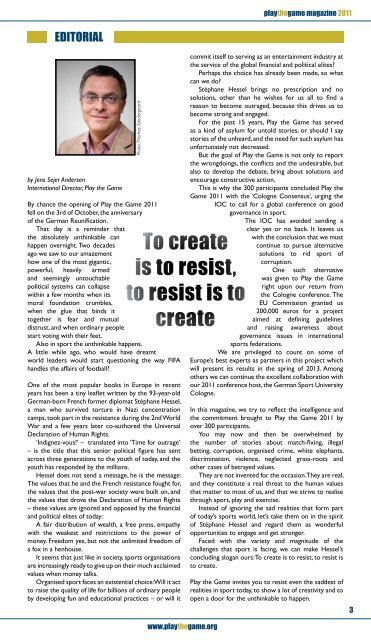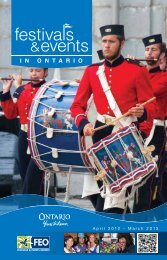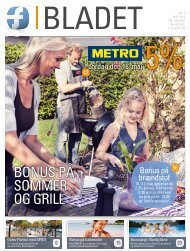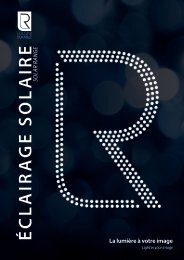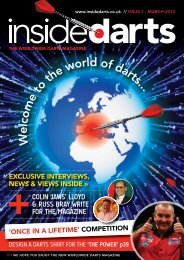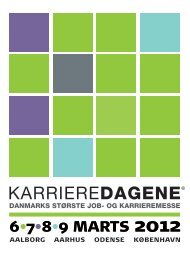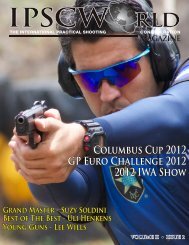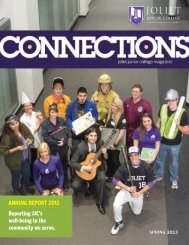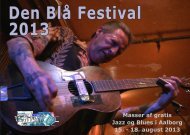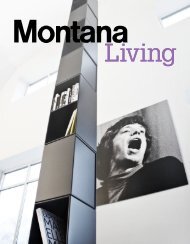playthegame - UniFlip
playthegame - UniFlip
playthegame - UniFlip
You also want an ePaper? Increase the reach of your titles
YUMPU automatically turns print PDFs into web optimized ePapers that Google loves.
EDITORIAL<br />
by Jens Sejer Andersen<br />
International Director, Play the Game<br />
By chance the opening of Play the Game 2011<br />
fell on the 3rd of October, the anniversary<br />
of the German Reunification.<br />
That day is a reminder that<br />
the absolutely unthinkable can<br />
happen overnight. Two decades<br />
ago we saw to our amazement<br />
how one of the most gigantic,<br />
powerful, heavily armed<br />
and seemingly untouchable<br />
political systems can collapse<br />
within a few months when its<br />
moral foundation crumbles,<br />
when the glue that binds it<br />
together is fear and mutual<br />
distrust, and when ordinary people<br />
start voting with their feet.<br />
Also in sport the unthinkable happens.<br />
A little while ago, who would have dreamt<br />
world leaders would start questioning the way FIFA<br />
handles the affairs of football?<br />
One of the most popular books in Europe in recent<br />
years has been a tiny leaflet written by the 93-year-old<br />
German-born French former diplomat Stéphane Hessel,<br />
a man who survived torture in Nazi concentration<br />
camps, took part in the resistance during the 2nd World<br />
War and a few years later co-authored the Universal<br />
Declaration of Human Rights.<br />
‘Indignez-vous!’ – translated into ‘Time for outrage’<br />
– is the title that this senior political figure has sent<br />
across three generations to the youth of today, and the<br />
youth has responded by the millions.<br />
Hessel does not send a message, he is the message:<br />
The values that he and the French resistance fought for,<br />
the values that the post-war society were built on, and<br />
the values that drove the Declaration of Human Rights<br />
– these values are ignored and opposed by the financial<br />
and political elites of today:<br />
A fair distribution of wealth, a free press, empathy<br />
with the weakest and restrictions to the power of<br />
money. Freedom yes, but not the unlimited freedom of<br />
a fox in a henhouse.<br />
It seems that just like in society, sports organisations<br />
are increasingly ready to give up on their much acclaimed<br />
values when money talks.<br />
Organised sport faces an existential choice: Will it act<br />
to raise the quality of life for billions of ordinary people<br />
by developing fun and educational practices – or will it<br />
Photo: Thomas Søndergaard<br />
To create<br />
is to resist,<br />
to resist is to<br />
create<br />
www.<strong>playthegame</strong>.org<br />
<strong>playthegame</strong> magazine 2011<br />
commit itself to serving as an entertainment industry at<br />
the service of the global financial and political elites?<br />
Perhaps the choice has already been made, so what<br />
can we do?<br />
Stéphane Hessel brings no prescription and no<br />
solutions, other than he wishes for us all to find a<br />
reason to become outraged, because this drives us to<br />
become strong and engaged.<br />
For the past 15 years, Play the Game has served<br />
as a kind of asylum for untold stories, or should I say<br />
stories of the unheard, and the need for such asylum has<br />
unfortunately not decreased.<br />
But the goal of Play the Game is not only to report<br />
the wrongdoings, the conflicts and the undesirable, but<br />
also to develop the debate, bring about solutions and<br />
encourage constructive action.<br />
This is why the 300 participants concluded Play the<br />
Game 2011 with the ‘Cologne Consensus’, urging the<br />
IOC to call for a global conference on good<br />
governance in sport.<br />
The IOC has avoided sending a<br />
clear yes or no back. It leaves us<br />
with the conclusion that we must<br />
continue to pursue alternative<br />
solutions to rid sport of<br />
corruption.<br />
One such alternative<br />
was given to Play the Game<br />
right upon our return from<br />
the Cologne conference. The<br />
EU Commission granted us<br />
200,000 euros for a project<br />
aimed at defining guidelines<br />
and raising awareness about<br />
governance issues in international<br />
sports federations.<br />
We are privileged to count on some of<br />
Europe’s best experts as partners in this project which<br />
will present its results in the spring of 2013. Among<br />
others we can continue the excellent collaboration with<br />
our 2011 conference host, the German Sport University<br />
Cologne.<br />
In this magazine, we try to reflect the intelligence and<br />
the commitment brought to Play the Game 2011 by<br />
over 300 participants.<br />
You may now and then be overwhelmed by<br />
the number of stories about match-fixing, illegal<br />
betting, corruption, organised crime, white elephants,<br />
discrimination, violence, neglected grass-roots and<br />
other cases of betrayed values.<br />
They are not invented for the occasion. They are real,<br />
and they constitute a real threat to the human values<br />
that matter to most of us, and that we strive to realise<br />
through sport, play and exercise.<br />
Instead of ignoring the sad realities that form part<br />
of today’s sports world, let’s take them on in the spirit<br />
of Stéphane Hessel and regard them as wonderful<br />
opportunities to engage and get stronger.<br />
Faced with the variety and magnitude of the<br />
challenges that sport is facing, we can make Hessel’s<br />
concluding slogan ours: To create is to resist, to resist is<br />
to create.<br />
Play the Game invites you to resist even the saddest of<br />
realities in sport today, to show a lot of creativity and to<br />
open a door for the unthinkable to happen.<br />
3


